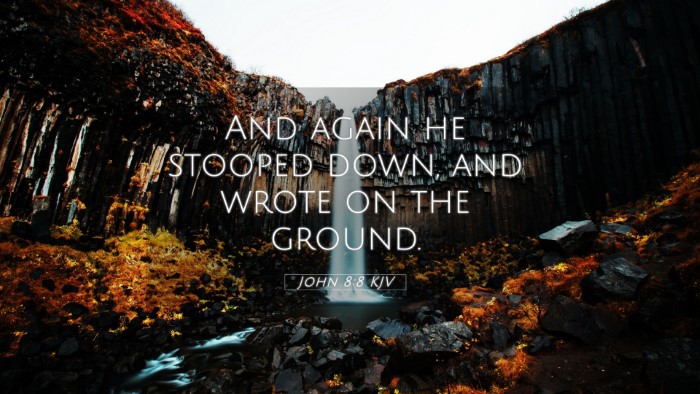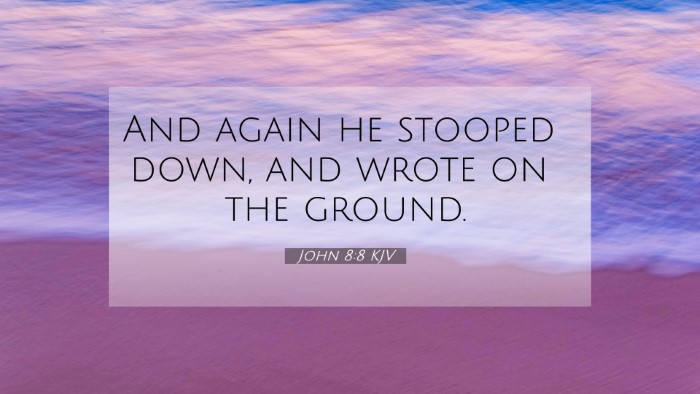Understanding John 8:8
John 8:8 states, "And again he stooped down, and wrote on the ground." This verse is embedded in a dramatic narrative where Jesus is confronted with a woman caught in adultery. The act of stooping down and writing on the ground signifies a profound teaching moment and embodies both humility and authority.
Contextual Analysis
Leading up to this moment, the Pharisees and scribes brought the woman before Jesus, seeking to trap Him with the law of Moses on adultery (Leviticus 20:10). Jesus’ response and actions carry significant weight, both culturally and spiritually.
Commentary Insights
-
Matthew Henry:
Henry notes that Jesus' act of writing on the ground demonstrates a deliberate pause, emphasizing His temperance and wisdom in the face of confrontation. This could signify His refusal to engage in their scheming disputes.
-
Albert Barnes:
Barnes asserts that Jesus' action serves to divert the attention from the accusers, allowing for a moment of reflection. This pedagogical measure underscores the importance of mercy over condemnation, as mirrored in the law.
-
Adam Clarke:
Clarke suggests that Jesus may have been writing down the sins of the accusers, an act that symbolizes the omniscience of Christ and a reminder that all have sinned and require grace.
Thematic Connections
This verse connects deeply with themes of restoration, mercy, and the nature of true judgment versus hypocritical condemnation.
Cross-References for John 8:8
- Romans 3:23: "For all have sinned, and come short of the glory of God." – Establishes the universal nature of sin.
- John 3:17: "For God sent not his Son into the world to condemn the world; but that the world through him might be saved." – Highlights Jesus' mission of salvation.
- Matthew 7:1: "Judge not, that ye be not judged." – Emphasizes the call to avoid hypocrisy in judgment.
- Galatians 6:1: "Brethren, if a man be overtaken in a fault, ye which are spiritual, restore such an one in the spirit of meekness..." – Focuses on the restorative approach rather than condemnation.
- Luke 6:37: "Judge not, and ye shall not be judged: condemn not, and ye shall not be condemned: forgive, and ye shall be forgiven." – Continues the theme of mercy.
- Proverbs 28:13: "He that covereth his sins shall not prosper: but whoso confesseth and forsaketh them shall have mercy." – Connects confession and mercy.
- James 2:13: "For he shall have judgment without mercy, that hath shewed no mercy; and mercy rejoiceth against judgment." – Highlights the necessity of mercy in judgment.
Conclusion
In conclusion, John 8:8 is a profound verse that reveals much about Christ's character and the overarching theme of mercy in the Scriptures. Using tools for Bible cross-referencing, we see its connections illustrated through the cross-references provided. This verse invites believers to reflect on their own judgments and the grace extended to them. The understanding of this passage is enriched when we consider it in light of related verses, creating a comprehensive framework for study and devotion.
Benefits of Cross-Referencing
Cross-referencing Bible verses enhances our understanding of the Scriptures, revealing thematic links across both the Old and New Testaments. Utilizing a Bible concordance or a Bible cross-reference guide can greatly assist in navigating these connections, allowing for deeper insight and richer study experiences.


